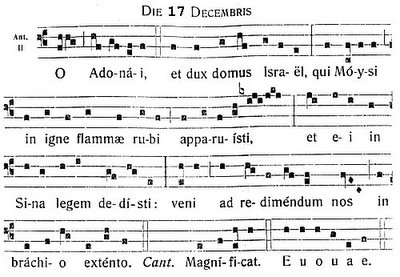December 17:

From the Blackfriars:
More from "Sapientia-tide: The Great O Antiphons."
Here's another version.
O Adonai and Leader of the house of Israel, who appearedst in the Bush of Moses in a flame of fire, and gavest him the law in Sinai: Come and deliver us with an outstretched arm.

From the Blackfriars:
More from "Sapientia-tide: The Great O Antiphons."
A curious entry appears in the December liturgical calendar of English Books of Common Prayer. The year 1561 brought an influx of minor saints from the Roman cycle back into the calendar of the Elizabethan Book of Common Prayer by way of the Latin Book of Common Prayer used in college chapels—places where Latin was expected to be “a tongue understanded of the people.” But among this number came an entry that was not the name of a saint or martyr. December 16th bears the legend: O Sapienta—O Wisdom. Formally ratified by its inclusion in the calendar of the 1662 Prayer Book—still the official prayer-book of the Church of England and often considered the liturgical norm for the Anglican Communion—this entry holds an indisputable place in our history grounding the “O” Antiphons in the Anglican tradition although they have never yet appeared in an authorized prayer book. The Roman Catholic Church has retained these antiphons as well, but their course begins on December 17th—meaning that the Anglican tradition retains an antiphon no longer used by Rome. Ironically, the missing antiphon is the one addressed to the Blessed Virgin Mary.
Here's another version.
3 comments:
Just a note--the good souls on the Ship have corrected me on this point; it seems that Common Worship includes the O Antiphons.
"Anglican tradition retains an antiphon no longer used by Rome. Ironically, the missing antiphon is the one addressed to the Blessed Virgin Mary."
Actually, if that's referring to "O Virgo Virginum", it seems the Roman Rite used it for the Feast of the Expectation of the Blessed Virgin Mary, December 18. It seems the feast is not longer a part of the Ordinary Form (unless there's an indult for it somewhere) but before 1962 it was still observed in the Missal and Breviary for certain places (although the second link below states that it was once kept by nearly the entire Latin Church).
See:
http://expectation-of-our-lady.blogspot.com/2007/12/december-18th-expectation-of-mary.html
and
http://vultus.stblogs.org/2009/12/feast-of-the-expectation-of-th-1.html
Interesting. Thanks, Pancho; will check out those links....
Post a Comment